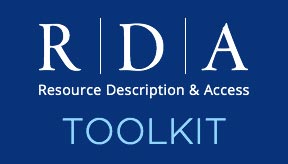Strategic Plan for RDA 2023-2025
RDA: a global standard enabling discovery of content
RDA: Resource Description and Access is a package of data elements, guidelines, and instructions for creating library and cultural heritage metadata that are well-formed according to international models.
These metadata are intended to support the discovery and identification of resources in library and other cultural heritage collections.
1. Develop RDA as a responsive, flexible and dynamic standard
The RDA Board, with responsibility for the strategic direction for the further development of RDA, and the RDA Steering Committee (RSC), with responsibility for the content and development of the standard, jointly commit to:
1.1 developing and maintaining RDA as a modern and relevant international standard for resource description and access;
1.2 upholding the Internationalization Principles and adapting RDA to the needs of the diverse cultures using RDA worldwide;
1.3 fostering an environment which builds confidence for users and potential users;
1.4 reaching out to cultural institutions across the GLAM (Galleries, Libraries, Archives, and Museums) sector to harmonize our practices to further support interoperability.
The Board also ensures that there is a clear maintenance program for ongoing and timely revisions of the standard and provides guidance to the RSC and ALA Digital Reference and issues arise.
2. Increase the internationalization
To help realize RDA’s potential, the RDA Board and RSC will work together to explore how the standard can be adopted, used and developed by data communities. Our goal is to make RDA an international, global standard which is as flexible as possible: a standard which any community of RDA users can adopt and implement around their own needs. We will identify new and potential markets, and their needs, and create strategies for reaching and engaging with these.
We will:
2.1 Identify gaps in the regions and identify national institutions and contacts in the regions where there are gaps
2.2 Support existing RDA regional representative bodies and the development of new regional bodies
2.3 Engage with communities to improve the applicability of RDA (e.g., language, sector, specialized resources)
3. Ensure a Sustainable Business model
The RDA Board will work with the Copyright Holders to review continuously the business model for RDA to ensure that it remains financially sustainable as RDA evolves. We will utilize RDA's existing and increasing strength as a flexible standard to drive growth while continuing to meet user needs.
The Board will:
3.1 Build on the work of our 2022 review of business models to ensure we have the best business model for our future sustainability
3.2 Investigate new business models in response to user needs and development priorities
4. Provide Relevant Governance
To facilitate the development and adoption of the standard, the RDA Board, in partnership with both the RSC and ALA Digital Reference, will review and revise the governance structure to ensure that it supports the RDA vision and strategic direction.
We will:
4.1 Evaluate the governance model at least once during the span of each strategic plan to ensure that it remains relevant and meets current needs, in the light of international use of RDA
4.2 Work with RDA regional representative bodies and the RSC to ensure effective operation of the governance structure, guaranteeing two-way communications between the RDA Board and RSC, as well as the community of current and future RDA users
4.3 Develop and govern RDA in line with the core ethical principles set out in the IFLA Code of Ethics for Librarians and other Information Workers
4.4 Work in collaboration with other standardisation bodies, including non-library bodies, to help achieve the interoperability of RDA with other applicable standards.
